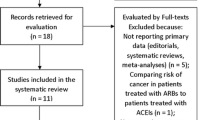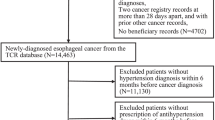Abstract
Background
Angiotensin signaling is suggested to be involved in tumorigenesis, tumor proliferation, and metastases. In colorectal cancer (CRC), it was demonstrated that angiotensin I-converting enzyme inhibitors (ACEIs) and angiotensin II receptor blockers (ARBs) may reduce the risk of CRC; however, their impact on tumor recurrence remains unknown. Therefore, in this study, we evaluated the impact of ACEIs/ARBs on tumor recurrence in CRC patients.
Patients and methods
We retrospectively investigated the clinicopathological data of 461 stage I–III CRC patients. We divided the patients into those who took an ACEI and/or ARB (the ACEI/ARB+ group) and those who did not (the ACEI/ARB− group), and we compared the two groups’ recurrence-free survival (RFS) using a Kaplan-Meier curve analysis and log rank test. We also examined the impact of AGTR1 expression on tumor recurrence, using two public CRC datasets.
Results
The Kaplan-Meier curves showed a trend toward improved RFS in the ACEI/ARB+ group versus the ACEI/ARB− group (p = 0.063). Subgroup analyses demonstrated that the RFS was significantly better in the ACEI/ARB+ group versus the ACEI/ARB− group in the patients with left-sided CRC (p = 0.030) and those with stage I CRC (p = 0.009). Consistent with these findings, the AGTR1 expression was higher in the left-sided versus right-sided colon (p = 0.048). High AGTR1 expression levels were associated with poor RFS in the GSE39582 dataset’s stage I–III CRC patients (p < 0.001), and this finding was also validated in the GSE17536 dataset (p = 0.023).
Conclusion
ACEI/ARB treatment may reduce tumor recurrence in left-sided CRC and early-stage CRC.


Similar content being viewed by others
References
Siegel RL, Miller KD, Jemal A (2018) Cancer statistics, 2018. CA Cancer J Clin 68(1):7–30
Harris M (2004) Monoclonal antibodies as therapeutic agents for cancer. Lancet Oncol 5(5):292–302
Hicklin DJ, Ellis LM (2005) Role of the vascular endothelial growth factor pathway in tumor growth and angiogenesis. J Clin Oncol 23(5):1011–1027
Brenner H, Kloor M, Pox CP (2014) Colorectal cancer. Lancet 383(9927):1490–1502
Childers WK (2015) Interactions of the renin-angiotensin system in colorectal cancer and metastasis. Int J Color Dis 30(6):749–752
Holmes S, Griffith EJ, Musto G, Minuk GY (2013) Antihypertensive medications and survival in patients with cancer: a population-based retrospective cohort study. Cancer Epidemiol 37(6):881–885
Nakai Y, Isayama H, Ijichi H, Sasaki T, Sasahira N, Hirano K, Kogure H, Kawakubo K, Yagioka H, Yashima Y, Mizuno S, Yamamoto K, Arizumi T, Togawa O, Matsubara S, Tsujino T, Tateishi K, Tada M, Omata M, Koike K (2010) Inhibition of renin-angiotensin system affects prognosis of advanced pancreatic cancer receiving gemcitabine. Br J Cancer 103(11):1644–1648
Sun H, Li T, Zhuang R, Cai W, Zheng Y (2017) Do renin-angiotensin system inhibitors influence the recurrence, metastasis, and survival in cancer patients?: evidence from a meta-analysis including 55 studies. Medicine (Baltimore) 96(13):e6394
Dolley-Hitze T, Jouan F, Martin B, Mottier S, Edeline J, Moranne O, le Pogamp P, Belaud-Rotureau MA, Patard JJ, Rioux-Leclercq N, Vigneau C (2010) Angiotensin-2 receptors (AT1-R and AT2-R), new prognostic factors for renal clear-cell carcinoma? Br J Cancer 103(11):1698–1705
Ager EI, Wen SW, Chan J, Chong WW, Neo JH, Christophi C (2011) Altered efficacy of AT1R-targeted treatment after spontaneous cancer cell-AT1R upregulation. BMC Cancer 11:274
Zhou L, Luo Y, Sato S, Tanabe E, Kitayoshi M, Fujiwara R, Sasaki T, Fujii K, Ohmori H, Kuniyasu H (2014) Role of two types of angiotensin II receptors in colorectal carcinoma progression. Pathobiology. 81(4):169–175
Neo JH, Malcontenti-Wilson C, Muralidharan V, Christophi C (2007) Effect of ACE inhibitors and angiotensin II receptor antagonists in a mouse model of colorectal cancer liver metastases. J Gastroenterol Hepatol 22(4):577–584
Neo JH, Ager EI, Angus PW, Zhu J, Herath CB, Christophi C (2010) Changes in the renin angiotensin system during the development of colorectal cancer liver metastases. BMC Cancer 10:134
Shimizu Y, Amano H, Ito Y, Betto T, Yamane S, Inoue T, Nishizawa N, Matsui Y, Kamata M, Nakamura M, Kitasato H, Koizumi W, Majima M (2017) Angiotensin II subtype 1a receptor signaling in resident hepatic macrophages induces liver metastasis formation. Cancer Sci 108(9):1757–1768
Azoulay L, Assimes TL, Yin H, Bartels DB, Schiffrin EL, Suissa S (2012) Long-term use of angiotensin receptor blockers and the risk of cancer. PLoS One 7(12):e50893
Makar GA, Holmes JH, Yang YX (2014) Angiotensin-converting enzyme inhibitor therapy and colorectal cancer risk. J Natl Cancer Inst 106(2):djt374
Mansouri D, McMillan DC, Roxburgh CS, Crighton EM, Horgan PG (2013) The impact of aspirin, statins and ACE-inhibitors on the presentation of colorectal neoplasia in a colorectal cancer screening programme. Br J Cancer 109(1):249–256
Zhou L, Li Y, Hao S, Zhou D, Tan RJ, Nie J, Hou FF, Kahn M, Liu Y (2015) Multiple genes of the renin-angiotensin system are novel targets of Wnt/beta-catenin signaling. J Am Soc Nephrol 26(1):107–120
Marisa L, de Reynies A, Duval A et al (2013) Gene expression classification of colon cancer into molecular subtypes: characterization, validation, and prognostic value. PLoS Med 10(5):e1001453
Smith JJ, Deane NG, Wu F, Merchant NB, Zhang B, Jiang A, Lu P, Johnson JC, Schmidt C, Bailey CE, Eschrich S, Kis C, Levy S, Washington MK, Heslin MJ, Coffey RJ, Yeatman TJ, Shyr Y, Beauchamp RD (2010) Experimentally derived metastasis gene expression profile predicts recurrence and death in patients with colon cancer. Gastroenterology. 138(3):958–968
Petrelli F, Tomasello G, Borgonovo K et al (2016) Prognostic survival associated with left-sided vs right-sided colon cancer: a systematic review and meta-analysis. JAMA Oncol
Rocken C, Rohl FW, Diebler E, Lendeckel U, Pross M, Carl-McGrath S, Ebert MPA (2007) The angiotensin II/angiotensin II receptor system correlates with nodal spread in intestinal type gastric cancer. Cancer Epidemiol Biomarkers Prev 16(6):1206–1212
Fujita M, Hayashi I, Yamashina S, Itoman M, Majima M (2002) Blockade of angiotensin AT1a receptor signaling reduces tumor growth, angiogenesis, and metastasis. Biochem Biophys Res Commun 294(2):441–447
Osumi H, Matsusaka S, Wakatsuki T, Suenaga M, Shinozaki E, Mizunuma N (2015) Angiotensin II type-1 receptor blockers enhance the effects of bevacizumab-based chemotherapy in metastatic colorectal cancer patients. Mol Clin Oncol 3(6):1295–1300
Cardwell CR, Mc Menamin UC, Hicks BM, Hughes C, Cantwell MM, Murray LJ (2014) Drugs affecting the renin-angiotensin system and survival from cancer: a population based study of breast, colorectal and prostate cancer patient cohorts. BMC Med 12:28
Bleeker WA, Hayes VM, Karrenbeld A, Hofstra RMW, Hermans J, Buys CHCM, Plukker JTM (2000) Impact of KRAS and TP53 mutations on survival in patients with left- and right-sided Dukes’ C colon cancer. Am J Gastroenterol 95(10):2953–2957
Wen Q, Dunne PD, O'Reilly PG et al (2017) KRAS mutant colorectal cancer gene signatures identified angiotensin II receptor blockers as potential therapies. Oncotarget. 8(2):3206–3225
Ahl R, Matthiessen P, Fang X et al (2018) Beta-blockade in rectal Cancer surgery: a simple measure of improving outcomes. Ann Surg
Li P, Wu H, Zhang H, Shi Y, Xu J, Ye Y, Xia D, Yang J, Cai J, Wu Y (2015) Aspirin use after diagnosis but not prediagnosis improves established colorectal cancer survival: a meta-analysis. Gut. 64(9):1419–1425
Restivo A, Cocco IM, Casula G et al (2015) Aspirin as a neoadjuvant agent during preoperative chemoradiation for rectal cancer. Br J Cancer 113(8):1133–1139
Author information
Authors and Affiliations
Contributions
Study concept and design, statistical analysis, and manuscript preparation were done by T.O. Data acquisition was done by T.O, Y.O, K.O, T.Y, Y.F, R.S, T.H, T.T, K.N, and H.I. Manuscript editing and review were done by Y.H and S.I.
Corresponding author
Ethics declarations
Conflict of interest
The authors declare that they have no conflict of interest.
Additional information
Publisher’s note
Springer Nature remains neutral with regard to jurisdictional claims in published maps and institutional affiliations.
Rights and permissions
About this article
Cite this article
Ozawa, T., Hashiguchi, Y., Yagi, T. et al. Angiotensin I-converting enzyme inhibitors/angiotensin II receptor blockers may reduce tumor recurrence in left-sided and early colorectal cancers. Int J Colorectal Dis 34, 1731–1739 (2019). https://doi.org/10.1007/s00384-019-03379-y
Accepted:
Published:
Issue Date:
DOI: https://doi.org/10.1007/s00384-019-03379-y




